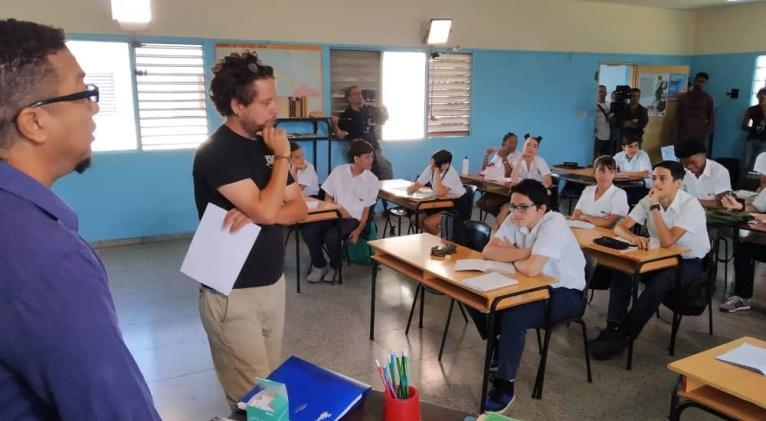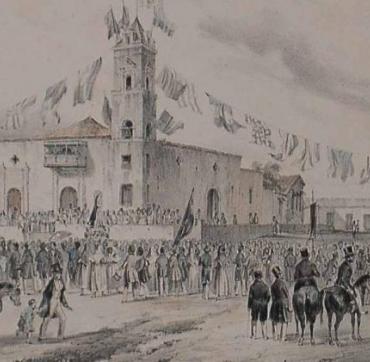From TV: is Bullying a Kid’s Stuff?
especiales

The program Una calle, mil caminos, that airs Cubavisión channel, recently premiered a more than timely, necessary telefilm. The topic? Bullying.
From the title, Kid’s Stuff , a phrase that we adults use so many times without even noticing the conflict to which we are referring, I felt that the audiovisual would speak especially with us, fathers and mothers, the family in general and also with the teachers and principals of schools.
Is it a product for teenagers or rather for the adults who accompany them? It was one of the questions that the audiovisual director, Alain Finalé, kindly agreed to answer via WhatsApp:

"It’s a product for both. It’s for the victim: so they know that they are not alone, that there are more people in that situation and that there’s a solution to their problem, because in some extreme cases it can even lead to suicide when they think they have no way out. It’s a product for the abuser: to tell them that what they’re doing is wrong, that they don’t have to continue repeating the cycle of violence; and it’s also a product for the family, both for the victim and the abuser. It’s a proposal that targets different audiences, it’s also for the institution, for the teacher, the staff that has to deal with children at school, for the Ministry of Education, it’s a material that tries to make everyone from their position find it useful, and use it as best they can".
In the introductory part of the program itself, the scriptwriter, Lil Romero, pointed out that the idea of the topic to be discussed came from you, what aroused that interest in you?
"As a child I was a somewhat withdrawn child, I read a lot and, in a certain way, I suffered the effects of school bullying. On the other hand, I am a trained psychologist and as soon as I entered the Faculty of Psychology I began to get closer to the subject in a more systematic way, from the theory. It seems to me that this is a matter that should be given more visibility, pay more attention to, and I wanted to make a teleplay where I could build the story from scratch, I did not want to find myself with a script already written. We don't do that many teleplays, in reality there are quite a few, so when we do manage to do one, it serves to try to influence a problem that deserves all that effort to achieve a result."

In addition to your training as a psychologist, did you have the advice of other specialists?
Delys Fernández, who is the program's assistant and a psychologist, was the first help from the very moment the teleplay was created, we went together to Lil Romero's house, we sat down with her, we did several work sessions... We proposed that different types of bullying were seen in the same story, to try to cover the whole problem a little more broadly and not focus only on one type of bullying and since them she began to give her advice, because Dely has served as psychologist for many years. Then, we wanted someone closer to working with adolescents to see this, so we sent it to Roxanne Castellanos. Her help was fundamental, because she has a lot of practical experience working with adolescents, she is also a very focused and effective person in what she does."
Definitely, the teleplay managed to make several edges of the subject visible, but how much was left unapproached?
"A lot was left unspoken, of course, bullying is a very complex phenomenon, because it has many edges to study: what happens to the victim, what happens to the abuser, because the abusive boys and girls are not bad people, they were not born like that, violence is generally a cycle, these abusive children surely come from dysfunctional families, they are also victims of violence in their family environment or they are mistreated children, ignored. This does not mean that this is always the case, but it’s very likely that they are reproducing the violence they live and that is an element to deal with, because they also need help.
"Another angle would be, for example, working closely with teachers, that is, how to make them discover the signs, how to train them, because perhaps they are prepared to teach their class, but not to face this type of situation, they are not aware of what are the solutions to handle at the theoretical level internationally. This teleplay is only the tip of the iceberg, a drop, but obviously there’s still a lot to deal with on this topic."

Have you had any feedback from the public, especially teenagers and adults involved in their training?
We’ve had enough feedback. The first was from the boys and girls from the Jorge Luis Aruñada school, in Nuevo Vedado, who were there working with us during their holiday week in April, they were the extras. That amazed me, because I thought no child was not going to come, however, they stayed every day collaborating as best they could. They were our first feedback: they liked what they were seeing, the scenes, then we did a premiere in two runs, because I wanted all the boys and girls who participated to be able to go and they loved it, even with the actors, who are young, we had feedback.
What about on social networks?
"In social networks, so far I have not found any negative opinion. There’s a significant reaction from parents who have children in this situation and who write excitedly, grateful that this issue is visible, and have a space on television. That feedback has been very interesting."

Paraphrasing the title of the space in which the telefilm was shown, of the thousand ways in which the conflict could be approach, you perhaps chose the most peaceful...
"I think that one of the things I like the most is the way in which the conflict was solved, the outcome of the story, where we did not want it to be "equal retaliation", I learn to defend myself and if you hit me, I would hit you, that couldn't be the solution. The solution had to be for the rest of the children, the teachers, to know what was happening, that is, to report it so that the abuser felt that what he was doing was wrong, expose them and that the rest of the boys collaborate and also decide not to be accomplices of violence, that was our main objective, that the solution would be the awareness of the public.
"I think that the only or one of the most effective ways to deal with school bullying is that the harassed boys, who are victims, feel that they have to be more brave, that they have to face the situation, but not from that same violence, things cannot be an eye for an eye, let it be known that the solution is to include the rest of their classmates, the teachers, the family, that everyone knows what’s happening and they don’t comply with the bullies".

You have commented on the support of highschools in the capital where the teleplay was shot and the tagging along of MINED . Is there any plan to take the debate to other schools in the country?
"I don't know if there will be any such project, but at least the school principal is asking for the material because she wants to run it on for all the students. It would be ideal if the Ministry of Education decides to distribute it and that this generates a debate on the matter, which ultimately, would really be the objective of the material, that it spurs a debate at an institutional level and that in schools the victims and bullies are involved in that debate, that the issue becomes visible at a national level".
What challenges and satisfactions have left you Kid’s Stuff?
"Challenges, yes, on a professional level, since I hadn't done any drama for 15 or 20 years. I had done Río Verde, together with Omar Ali, which was my first film and then El cuento chino, but I felt that I lacked experience, especially in the direction of actors, which is not easy at all, it’s quite complex and, of course, I had to catch up with everything that was the staging, let's say bring all that information contained in the script to a fitting audiovisualproduct, but it was interesting, luckily I had the help of Yaremis Pérez, who helped me a lot with the casting and with the direction of actors, I learned again, that is, at a professional level for me it was spectacular.
"It has given me a lot of satisfaction, especially this fact that I can do it, I can face a dramatization and I feel that I have the tools to make it happen, those are the best satisfactions, one says, how will this turn out for me? Will I be able to do it well? Will I even be able to do it? And look, it happened, I managed to put together a team around me that accompanied me in the best possible way, very professional people, above all we managed to create a spectacular work environment, which is difficult today, and it was very rich, it was a very satisfactory experience, where everyone did the best they could to find solutions, despite all setbacks that appeared when making an audiovisual, but creative solutions were found and I am left with the satisfaction that a beautiful, professional job was done and it also opened doors for me to other projects that I still can't comment on. For me it was, let's say, stepping up in my professional development as a filmmaker".

You also act in Kid’s Stuff, tell me about that experience and if you would dare with more complex characters.
"I love acting. I don't have any training as an actor, I don't even have experience, but I like it. Would I dare with more complex characters? I think so, if I had someone next to me to train me, to direct me, to help me with that, I am willing to learn and do it. Right now I don't have any plans, but if the opportunity arises, of course I would dare. Here in this teleplay, since it was a small role, I thought, well, this is the best time to try. Yaremis was still there with me and I told her: if you see my performance poor , tell me and we’ll look for someone else, but I think it went quite well.
What new projects are you busy with right now?
"Now I'm working on La Majomía, a program that I really like, that I really enjoy, because it's the type of television that I like to do: as informal as possible, carefree, relaxed, I think that our television suffers from excessive formalism in almost all of its shows, they are too modest and formal. I think a bit of self-assurance doesn't hurt anyone. There are people who don't like it? Well, but there are others who do. La Majomía is growing as a program and we've had spectacular musicians, like Beatriz Márquez, Dayron Ortiz, Vannia Borges with Emilio Vega, that is, we have just started and we have had consecrated people and also young people who have passed through there, I think the program is taking its course".
Translated by Amilkal Labañino / CubaSí Translation Staff














Add new comment